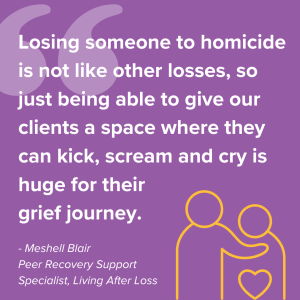In March 2021, Meshell Blair’s 19-year-old son, home for a visit from college, was killed while spending time downtown with friends.
Following the tragedy, Meshell sought a way to honor her son’s memory and found purpose by joining the Mothers of Murdered Columbus Children (MOMCC), a nonprofit organization that raises awareness about the rapid increase of crime resulting in murder in Columbus.
Meshell’s involvement with MOMCC led to a growing desire to advocate for others who have lost loved ones to homicide.
“Something was tugging at my heart that I wanted to do more,” she said. “I wanted to get involved with something where I could help other mothers like me.”
That moment came in June 2024 when Living After Loss was created with funding from the Alcohol, Drug and Mental Health Board of Franklin County (ADAMH). Managed by Columbus Public Health, Living After Loss provides peer support to families who have lost a loved one to homicide by offering companionship, grief support and case management as they walk with individuals on their journey after loss.
Meshell became one of the program’s two certified peer recovery specialists, embracing a role she felt was made for her.
“It just seemed like this is where I’m supposed to be, and this is what I’m supposed to be doing,” she said. “Yes, my son is gone, but I’m not going to let it get me down, so I will continue my work and sit with other moms who need me.”
In addition to offering a listening ear, Living After Loss assists individuals with a range of long-term support, including guidance with completing the Victims of Crime Application, navigating the court system, connecting with community groups to foster resilience and addressing clients’ basic needs.

“The biggest thing for us is to make sure there are no barriers to getting linked,” said Tahira Easley, program manager. “Our program cannot be effective unless we can make sure that clients are given resources to be able to meet those basic needs so we can then tap into the grief.”
From there, Tahira said her team prioritizes being present with homicide loss survivors, fostering heartfelt connections and acknowledging the complex emotions that accompany such a profound loss.
“Losing someone to homicide is not like other losses, so just being able to give our clients a space where they can kick, scream and cry is huge for their grief journey,” Meshell said.
Though the program is just six months old, Tahira shared that it’s already making a meaningful impact on affected families, giving her hope that it will continue to reach those in need.
“We had clients who weren’t leaving their homes, not bathing or cooking meals and now when we visit, they’re groomed and cooking for their families again, so it’s a really big deal,” Tahira said. “And clients tell us they hope our program grows because they want to apply to be a peer supporter one day.”
For Meshell, being a constant source of support for those navigating the pain of losing a loved one to homicide has been a meaningful way to honor her son’s memory while helping others find strength and hope.
“This work is more rewarding than I could’ve ever dreamed,” she said. “I’m here to let homicide loss survivors know that they are not alone. I am here and I am a phone call or text away.”
If you or someone you love needs support, fill out this peer support referral form. If you are struggling or in crisis, call, text or chat the 988 Suicide & Crisis Lifeline.
